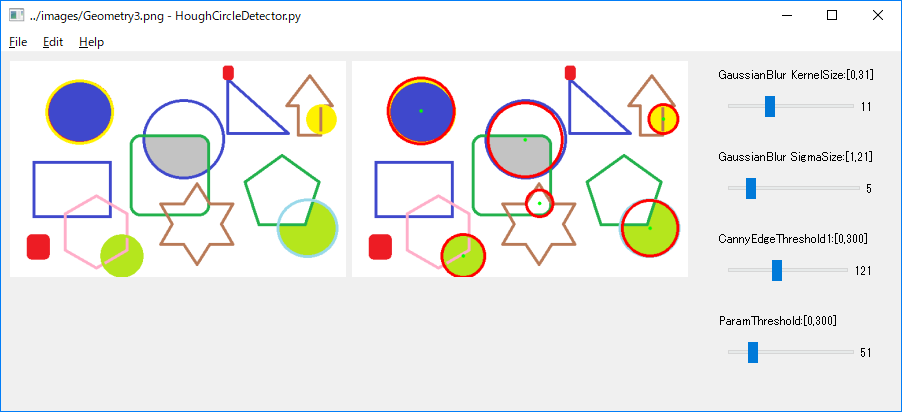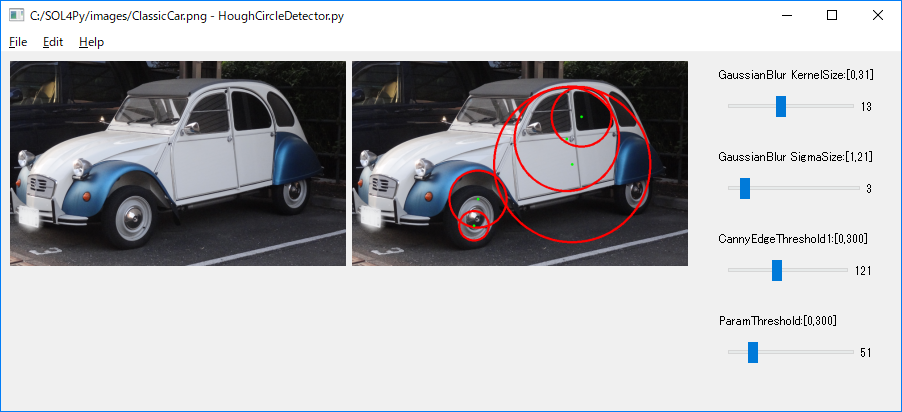|
SOL4Py Sample: HoughCircleDetector
|


#******************************************************************************
#
# Copyright (c) 2018-2019 Antillia.com TOSHIYUKI ARAI. ALL RIGHTS RESERVED.
#
# This program is free software: you can redistribute it and/or modify
# it under the terms of the GNU General Public License as published by
# the Free Software Foundation, either version 3 of the License, or
# (at your option) any later version.
#
# This program is distributed in the hope that it will be useful,
# but WITHOUT ANY WARRANTY; without even the implied warranty of
# MERCHANTABILITY or FITNESS FOR A PARTICULAR PURPOSE. See the
# GNU General Public License for more details.
#
# You should have received a copy of the GNU General Public License
# along with this program. If not, see <http://www.gnu.org/licenses/>.
#
#******************************************************************************
# encodig: utf-8
# HoughCircleDetector.py
#2018/08/25
#This is a simple example to apply cv::HoughLinesP API to
# a gray scale edged image gotten from cv::Canny API.
# See: http://docs.opencv.org/2.4/doc/tutorials/imgproc/imgtrans/hough_lines/hough_lines.html
import sys
import os
import cv2
import traceback
from PyQt5.QtCore import *
from PyQt5.QtWidgets import *
from PyQt5.QtGui import *
#
sys.path.append('../')
from SOL4Py.ZApplicationView import *
from SOL4Py.ZLabeledComboBox import ZLabeledComboBox
from SOL4Py.ZLabeledSlider import ZLabeledSlider
from SOL4Py.opencv.ZOpenCVImageView import ZOpenCVImageView
from SOL4Py.ZVerticalPane import ZVerticalPane
class MainView(ZApplicationView):
# Inner classes
#--------------------------------------------
class SourceImageView(ZOpenCVImageView):
def __init__(self, parent):
ZOpenCVImageView.__init__(self, parent)
def load(self, filename):
self.load_opencv_image(filename)
self.update()
class DetectedImageView(ZOpenCVImageView):
def __init__(self, parent):
ZOpenCVImageView.__init__(self, parent)
self.gray_image = None
def load(self, filename):
self.load_opencv_image(filename)
source_image = self.get_opencv_image()
self.gray_image = cv2.cvtColor(source_image, cv2.COLOR_RGB2GRAY)
def detect(self, ksize, sigma, threshold1, paramThreshold):
ksize = int(ksize)
source_image = self.get_opencv_image()
#1 Apply cv::GaussianBlur to the source_image.
blurred_image = cv2.GaussianBlur(self.gray_image, (ksize, ksize), sigma, sigma)
#2 Apply cv::HoughCircles to the grayImage to detect circles.
w, h = blurred_image.shape
circles = cv2.HoughCircles(blurred_image, cv2.HOUGH_GRADIENT,1,
minDist=w/8, param1=threshold1, param2=paramThreshold, minRadius=0,maxRadius=0)
if circles is not None:
detected_image = source_image.copy()
for circle in circles[0,:]:
#3 Draw the center of the circle of radius = 3
cv2.circle(detected_image, (circle[0], circle[1]), 3, (0,255,0), -1, 8, 0 )
#4 Draw the outline of the circle of radius
cv2.circle(detected_image, (circle[0], circle[1]), circle[2], (0,0,255), 3, 8, 0 )
self.set_opencv_image(detected_image)
self.update()
#--------------------------------------------
# MainView Constructor
def __init__(self, title, x, y, width, height):
super(MainView, self).__init__(title, x, y, width, height)
filename = "../images/Geometry3.png"
# 1 Create first imageview.
self.source_image_view = self.SourceImageView(self)
# 2 Create second imageview.
self.detected_image_view = self.DetectedImageView(self)
# 3 Load the file
self.load_file(filename)
# 4 Add two image views to a main_layout of this main view.
self.add(self.source_image_view)
self.add(self.detected_image_view)
self.show()
# Add control pane to MainView
def add_control_pane(self, fixed_width=200):
# Control pane widget
self.vpane = ZVerticalPane(self, fixed_width)
self.ksize = 3
self.ksize_slider = ZLabeledSlider(self.vpane, "GaussianBlur KernelSize", take_odd =True,
minimum=0, maximum=31, value=self.ksize)
self.ksize_slider.add_value_changed_callback(self.ksize_value_changed)
self.vpane.add(self.ksize_slider)
self.sigma = 2
self.sigma_slider = ZLabeledSlider(self.vpane, "GaussianBlur SigmaSize", take_odd =True,
minimum=1, maximum=21, value=self.sigma)
self.sigma_slider.add_value_changed_callback(self.sigma_value_changed)
self.vpane.add(self.sigma_slider)
self.threshold1 = 120
self.threshold2 = 50
self.threshold1_slider = ZLabeledSlider(self.vpane, "CannyEdgeThreshold1", take_odd =True,
minimum=0, maximum=300, value=self.threshold1)
self.threshold1_slider.add_value_changed_callback(self.slider1_value_changed)
self.vpane.add(self.threshold1_slider)
self.threshold2_slider = ZLabeledSlider(self.vpane, "ParamThreshold", take_odd =True,
minimum=0, maximum=300, value=self.threshold2)
self.threshold2_slider.add_value_changed_callback(self.slider2_value_changed)
self.vpane.add(self.threshold2_slider)
self.set_right_dock(self.vpane)
# Show FileOpenDialog and select an image file.
def file_open(self):
options = QFileDialog.Options()
filename, _ = QFileDialog.getOpenFileName(self,"FileOpenDialog", "",
"All Files (*);;Image Files (*.png;*jpg;*.jpeg)", options=options)
if filename:
self.load_file(filename)
def load_file(self, filename):
self.source_image_view.load(filename)
self.detected_image_view.load(filename)
self.detected_image_view.detect(int(self.ksize), int(self.sigma), self.threshold1, self.threshold2 )
self.set_filenamed_title(filename)
# Slider value changed callback.
def ksize_value_changed(self, value):
self.ksize = int(value)
if self.ksize % 2 == 0:
self.ksize = (self.ksize * 2)/2 + 1
# Kernel size should be odd.
#print("slider_value_changed:{}".format(ksize))
self.detected_image_view.detect(int(self.ksize), int(self.sigma), self.threshold1, self.threshold2 )
# Slider value changed callback.
def sigma_value_changed(self, value):
self.sigma = int(value)
#print("slider_value_changed:{}".format(ksize))
self.detected_image_view.detect(int(self.ksize), int(self.sigma), self.threshold1, self.threshold2 )
def slider1_value_changed(self, value):
self.threshold1 = int(value)
self.detected_image_view.detect(int(self.ksize), int(self.sigma), self.threshold1, self.threshold2 )
def slider2_value_changed(self, value):
self.threshold2 = int(value)
self.detected_image_view.detect(int(self.ksize), int(self.sigma), self.threshold1, self.threshold2 )
#*************************************************
#
if main(__name__):
try:
app_name = os.path.basename(sys.argv[0])
applet = QApplication(sys.argv)
main_view = MainView(app_name, 40, 40, 900, 380)
main_view.show ()
applet.exec_()
except:
traceback.print_exc()
Last modified: 22 Mar. 2019

